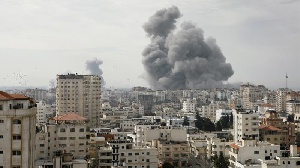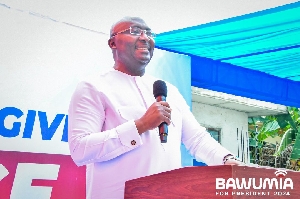Opinions of Thursday, 22 August 2013
Columnist: Marfo, Nana
Political incivilty in Ghana
Has disrespect become mainstream in Ghana politics?
I presume Ghanaians want to be united, however we know that the only way we can be united is by being different. We want to have respect for authority, but we know that too much respect for it breeds contempt of the people who become obedient out of fear.
it has been said that the difference between war and revolution is that in war the sovereign sacrifices the people and in revolution it is the people who sacrifice the ruler.
However diplomatic revolution must target educating the masses to become judgemental of the performance of our leaders not insults and incitement.
Common features of civility are having good manners, being willing to listen, and showing a concern for other people’s feelings and opinions. But political civility requires more than politeness and respectful listening; it also requires a realization that we must live together and ultimately compromise on some things where we differ in fundamental ways. Its surprising that Ghana cannot solve problems through politics. Civility as ones willingness to compromise is essential part of politics which is less exhibited by NDC and NPP executives.
Political polarization between the two major political parties has increased dramatically in the last 20 years, and with this polarization, civility has waned. Name-calling and angry exchanges occur regularly on cable television channels and radio talk show programs every now and then.
Could that be the ideal way of gaining political points or winning the interest of the ordinary Ghanaian, and will it be beneficial to our children who will one day become leaders of the blessed country Ghana?
Today, the two parties are split over basic questions about the Supreme Court, school feeding programme, loans and policies.
Ghana’s politics begins from interest and selfish ambition which is expressed in terms of conflict and often ends in paranoid. That’s why if we want to degrade someone in politics or when a politician wants to attack another politician he claims his adversary is being political.
Incivility is primarily the result of political polarization between the two political parties, and this seems to have its roots in the growing inequality in Ghana.
The growth of cable news and the increasing role community radio stations owned by politicians and social welfare groups” that spend prodigiously on political advertisements have added to the problem by fuelling political polarization and incivility. Today in Ghana it is the political parties that are fighting with one another while a growing group of independents looks on
With growing inequality, feckless political parties, even more irresponsible independent political groups, and a media goading everyone on, it is hard to see how civility will increase any time soon amongst the inhabitants of the 10 regions. We are simply in one of those periods in Ghana politics where polarization and incivility dominate our politics.
Some of these acts of incivility are pre meditated and masterminded by party gurus. They call it dirty politics where the end must justify the means at all cost.
Tribalism is always associated to incessant, insane, unmitigated guff, hence passion overshadows individual’s assessment of certain delicate and unwarranted utterances made by such politicians.
GLA NEWS can only urge good citizens of Ghana to reject the demonization of one’s political opponents and to recognize the importance of compromise, courteous act or utterance which can benefit the next generation.
LONG LIVE GHANA, LONG LIVE AFRICA
BY Nana Marfo(Sir Richie)
Editor-Ghana London Accra News-London- 0044 203 086 90 94












